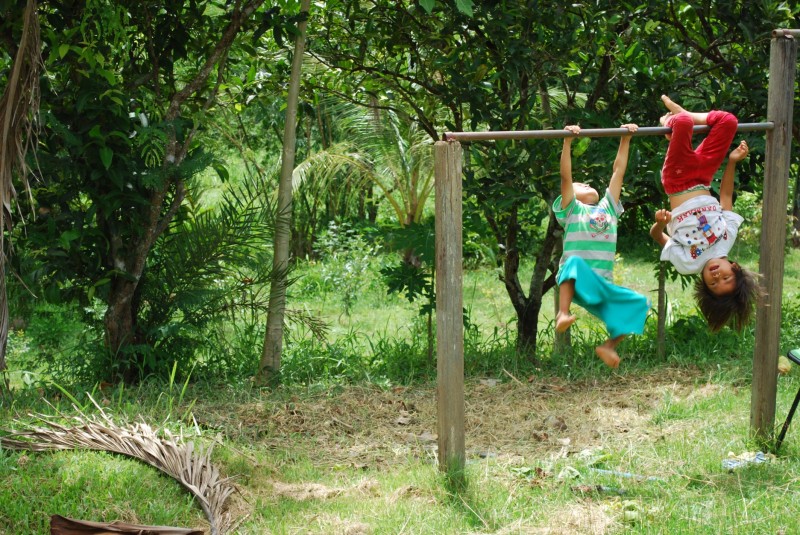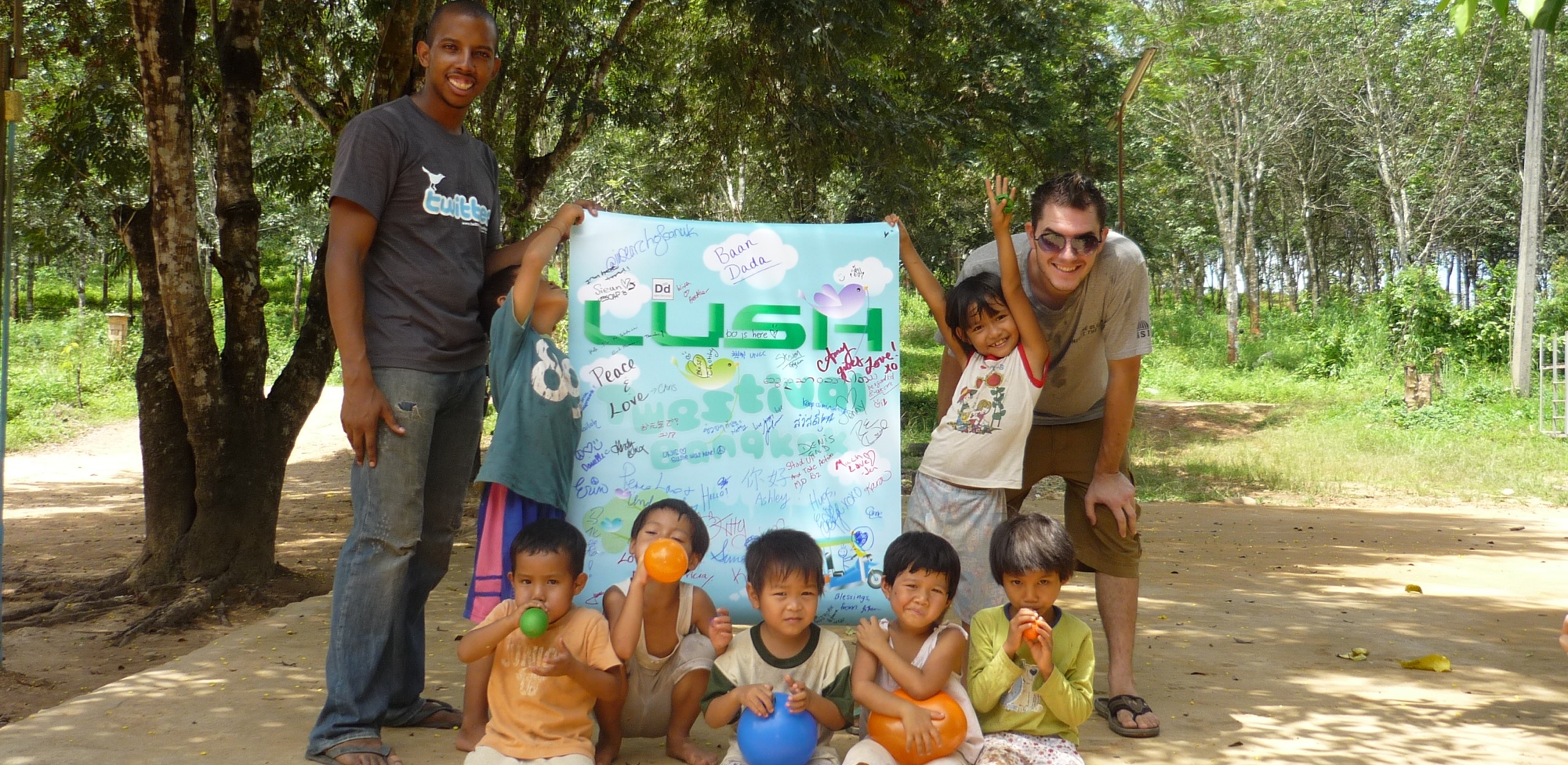3 Ways To Be An Unconventional Giver: What Jesus, Gandhi and Spiderman Knew
This is a guest post I’m excited to host from Dwight Turner, founder of In Search Of Sanuk.
You’re already en route to your thrilling lifestyle so why are you still giving the same way? In the footsteps of Jesus, Ghandi, Spiderman and all four Ninja Turtles, here are three steps to make your giving as revolutionary as your lifestyle.
Stop Giving Only When It’s Convenient
The template lifestyle dictates that you should probably begin thinking about what you can give back a few years before you expect to die. How much have you bought into that mentality? Have you repeatedly postponed giving until you have more money, more stability, and more success? My first big project last year was to design a fundraiser for Bangkok’s Refugee Center. I ended up throwing an art show that provided much needed funds for the center and got more people in the city talking about my initiative. However, had I let the unpredictability of my personal life govern the decision to be involved, it would have been scheduled for 2030. To play a role in social change, we can no longer conceptualize giving the same way we think about clipping our toenails or doing our taxes. Break the mold and transform giving from a mundane task to a part of your thrilling lifestyle.

Embrace Risky Giving
As a society we have bought the idea that giving should be feel good and secure. Sometimes it can be, but we are wrong to believe putting others’ well being before our own will be all smiles and rainbows. My hunch is this is because we’re not giving for the right reasons to begin with. I cringe when I hear, “Give and you WILL RECEIVE.” How much of what you give is steeped in what you’re hoping to receive? Are you doing it so more people will buy your product or read your blog? In reality, the people giving the most are hardly recognized or rewarded. Stop and think about your teachers and I know you’ll get my point. Why then do you expect some selfish reward for doing what we know is right? Really want to be an unconventional giver? Try this:
Give when no one is looking. Give and expect nothing. Be risky, be taken for granted and give purely.
Give From the Bottom of your Hurt
Your parents tried it. You tried it. So where did giving from the heart get us? Well, besides forcing smart non profits and NGOs to scramble, rearranging budgets or compromising their services for overpaid marketers who know how to tap into our vanity. To our detriment we’ve created an environment where cause marketers have to dupe us into repeatedly buying a latte laced with ‘feel good’ to do something noble like saving the rain forest. It works, so everyday we fall out of bed and into line for innumerable magic lattes until we’ve purchased such a monstrous caseload of feel good that we honestly believe we can end poverty without ever changing our daily routine. Nothing wrong with a laced latte, right? But, if you’re reading this it’s because you’ve already fallen off the bandwagon. So I challenge all former bandwagon riders to start giving from the bottom of your hurt. You don’t have to be hungry for long to have enough of an idea of what starving might be like. Likewise, you don’t have to travel to countries where every meal is an appetizer just to realize more should be done to relieve the suffering of those less fortunate than us. Pain is universal. Give when it hurts and because it hurts.
Thrilling Heroics Consulting is a regular supporter of In Search of Sanuk and fully sponsored their December teaching initiative in the Bangkok slums. Begin your unconventional giving by donating today.







I agree with every point! I think that giving should come from the bottom of our own, not always good, experiences – only then do we understand the power of our support. Even if it’s just a little bit of money, or clothing given to a poorer kid from the area…there is much work to be done!
I don’t often quote the bible, but something that has stuck with me since I was younger, and I’m paraphrasing here, is a story in the bible about a widow who gave only 2 cents to help the poor. Now others gave more, but Jesus said that this woman had given the greatest amount because others gave out of abundance but she gave out of her lack. That sticks with me.
We sometimes think we lack the ability to give, but there is so much that we can contribute to this world to help others and make it better world other than just giving money.
A lot of times people in need, need more than just money, they need time, and people to care.
Late to this post I know, cleaning out some evernotes…love the thoughts on giving here and your comments Mike. We’re so blessed, those in the lifestyle design space especially. We’re fighting to escape the rat-race, understand this thing called entrepreneurship, and live out our dreams (hopefully a large part in giving) We can’t ignore others when we are so blessed in mind and will power and so many other things. Always take example that woman who gave her last 2 cents!
Great post.
I’ve always believed in #2. If you give or help in front of others, you are just doing it for the attention. Definitely not authentic living (http://untemplater.com/self-improvement/philosophy/a-short-guide-to-true-authenticity-break-away-from-the-herd-2/). I try to do as much as possible hidden in the shadow. I believe that receiving recognition from others actually diminishes the good. I only talk about my volunteering where I feel that it will help others realize what they can do or to help land a job.
#3 is also a very powerful one. A friend of mine is a pastor who’s family gave up everything for him to go to seminary. They ate from food pantries. Just 3 months ago, he started his own church, and it already has the largest food pantry in the area. Because he remembers his hurt, gives from his hurt, and inspires others to give from it too.
Great article about giving. Giving must risk you something not only the unwanted things.
Lol, great blog title. Love it, I had to read.
“How much of what you give is steeped in what you’re hoping to receive?”
So true… reminds me of the Lance Armstrong foundation’s LIVEstrong band, where it started of sincere and then turned out to be the “it” thing to do in pop culture and recieve some sort of validation amongst your peers for just wearing the band.
I honestly don’t think most people give enough back. Either to charity, society, friends, family or the random homeless guy on the corner of your street it’s a great feeling when you give back.
And when you feel good about giving back, you want to do more to help which has the knock on effect of making you more determined to achieve great things so you can give even more back to the little guy.
Great article, Dwight. Really makes you think about how much you give back.
“Giving from the bottom of your hurt.” That really indicates when you’re really sacrificing, and when it really counts.
I’m not claiming to be a fantastic giver or anything, but last week, it got pretty cold in Florida, and a local organization was collecting blankets, coats, and other clothing accessories for the homeless families in Tampa(we have a sizable population)…anyway…a friend mentioned we give, and I remember laying out my 4 coats and thinking…It would be sort of messed up giving the worst one I had…I bit the bullet and gave 2. I still can get better, but it does feel good to move in the direction of becoming a conduit of what you’ve been blessed with, as opposed to a store house, or hoarder.
Really great blog post! Cody, have this guy back here again! ;-> Using new media, blogging, and journalism as ways to advocate, organize, and promote social causes is very inspiring, and I hope more and more of us follow your example!
great points here. I like the idea of Risky giving – give and don’t expect anything in return
@Jonny, I knew you would love that title. When I saw it, I immediately thought of you! I’m sure Dwight picked up some inspiration from you somewhere!
@Veron, I’ve been encouraging Dwight to write for TH for months! Really really glad to finally have an article from him here, and I’m sure we’ll be working on more things together in the future. But make sure you check him out at In Search Of Sanuk too.
Awesome read! I would add also not to give ONLY when there is some major catastrophe. Please dont take this the wrong way, as it is a major catastrophe and my heart pains over what has happened in Haiti, but in light of this major catastrophe there is a large outpouring of resources. This is great as it is really needed, but at the same time I think we need to encourage people to be generous in the in-between times. The times where there aren’t millions of affected, when maybe there is just one. Love what you guys are saying.
Cody – I am going to be in Phuket/Ao Nang for the month of Feb and might fly up to Bangkok for a long weekend in between. Would love to catch up with you while I am there. I don’t know if it will happen yet but I am hoping to.
@JeremyWight
Cody,
Great post.
“Give when no one is looking. Give and expect nothing. Be risky, be taken for granted and give purely.”
I have been doing this a lot lately.
The funny thing about giving and expecting nothing, is that you actually get more in return.
It makes you a better person, for lack of a better term.
How can you put a price on being a better person?
– MPM
Excellent post, Dwight / Cody.
There are so many references from different holy texts that I could pull from here, that it’d be impossible to fit them all. One beautiful passage in particular that sticks out in my mind though, is from the New Testament in the Bible (paraphrased):
“Then the King will say to those on his right, ‘Enter, you who are blessed by my Father! Take what’s coming to you in this kingdom. It’s been ready for you since the world’s foundation. And here’s why –
I was hungry and you fed me,
I was thirsty and you gave me a drink,
I was homeless and you gave me a room,
I was shivering and you gave me clothes,
I was sick and you stopped to visit,
I was in prison and you came to me.’
“Then, surprised, they will say, ‘Master, what are you talking about? When did we ever see you hungry and feed you, thirsty and give you a drink? And when did we ever see you sick or in prison and come to you?’ Then the King will say, ‘I’m telling the solemn truth: Whenever you did one of these things to someone overlooked or ignored, that was me — you did it to me.'”
Absolutely beautiful.
I’m really glad to see someone in the Lifestyle Design community writing about issues of this magnitude, and beyond the scope of ‘how I can make my own life better’. If the standard, 20th/21st-century American template lifestyle is the thing we are striving to be liberated from – and, truth be told, it is a system whose success is in many ways predicated upon the suffering and loss of others – it logically follows that, in our liberation, we should strive towards healing the collective hurt around us – both domestic and international.
Certainly, attaining personal freedom will be the huge motivator behind folks’ efforts towards breaking free of the mold. Certainly, life will be better if we are free to live from our core passions and pursue all that the world has to offer in the way of exhilarating experience. However, I submit that – just like the muses we finance these experiences with – these things are a means, not the ends. If the final word in a life well-lived (as I define) it is the freedom to fully pursue my own creative passions, I will, upon reaching that ‘final word’, be wholly dissatisfied. The sheer fact that a given person is disillusioned with the typical mode of life is a testament to the fact that she or he is not living an unexamined life. Further, it is these individuals – I believe – who in their growing liberation are most empowered to help liberate others and effect change. The necessity for these changes is the source of the spark.
Lifestyle Design – as a term and practice – is a symptom of something much bigger than its parts; I think this is beautiful.
The journey is going to be different for everyone, but I feel that the further along on that road that we go, it will become readily apparent that we are striving towards the same ends – that is, an ends beyond personal want and personal satisfaction. For some, this might be through the giving of financial resources; for others, it could be physical assistance, education, or mentoring. Still – regardless of background or faith – we all – especially those of us living an examined life, and those of us in the growing LD sphere – have an exceptional opportunity – and responsibility – to impact lives for the good, and cultivate renewal throughout the hurting (read: all) cultures of the world.
-Anthony
PS – Thanks for the thought-fuel. I think I know what one of my first big posts will be on my new site!
Embrace Risky Giving….
I think we all need a little more risk in our life to truly enjoy it and giving is one risk I need to implement more…
David Damron
LifeExcursion
Thanks everyone for your thoughtful responses. Perhaps I will have to discuss another post with Cody to address your responses in depth (Thx @Veron).
@Johnny the title was inspired by another friend Matt (@mehtin on twitter) after I spoke at Barcamp Singapore on the topic, “How to be Broke and Save the World”
@Anthony I can here your wheels turning. Make sure I see what you come up with on your new site and let me know if I can contribute some way.
@everyone Yes, it is clear that those of us who can’t give financially have a responsibility to be creative, persistent, and driven in our pursuit of social change. We have a tendency to credit the person who writes a check with more honor than people who make time to show how much they care in other ways. Ok… I’m forcing myself to stop there.
The other thing I will briefly mention is that there is nothing inherently wrong with getting attention for what you’re doing. Obviously, there are like forty links in this blog back to In Search of Sanuk where we’re hoping people will go and donate. However, it’s our expectation that corrupts our intentions. So whether people decide to give to my cause or not, it doesn’t effect my mission. Also a point I could flesh out more for discussion later.
Thank you and please continue sharing.
This is definitely the good approach. Let’s not give only when it is convenient and easy. But I think it needs some nuancing.
1) I believe in well-regulated market forces to make some of the biggest positive changes possible on this planet. At the individual level, I believe people should make positive contributions by doing what they do best, and be motivated by that. They have to figure out what they are good at, and transform it into something positive through an additional effort.
A very simple example on this is LUSH (yes, again), that you, Dwight, and I started together. I have the will to make strong positive changes. But, unlike you, I don’t know how to interact in a fun manner with kids. We thus got together and finally created, not without much effort, something that makes positive change, exactly the way we wanted it. But we did so by combining our strenghts in a way that required efforts, but in which we still could do what we do best.
I believe that another essential element is to do what we like, up to a certain point. Indeed, the same as market forces, massive and continuous positive contributions will only happen if there is some personal joy involved.
I thus encourage everyone to think how what they do best, and how, with small or much effort, each can do positive change.
2) I think the word “giving” is misleading, especially in Thailand where doing good is mostly centered around giving money or goods away. I would replace the word “give” by help or support. And this, In Search of Sanuk does very well.
3) Helping or supporting, even when combined with efforts with your own joy and talents, is something that still needs much thoughts. It needs to be well planned, designed and thought about, not without losing some spontaneity in it. The reason is that the maximum efficiency should be achieved in all situations.
Whereas the private sector tries in any way to be more efficient than its competitors, the “giving” sector does not have such a motivation. In this case, thus, it is each persons moral duty and responsibility to try as much as possible to be as efficient in terms of postivie end results.
My approach to supporting and helping has been shaped by these three elements mentionned above. I am not sure whether it is the right one, but it seems more and more that it is the best way of doing it.
Julien
loved the “latte laced with feel-good” point. especially here in the states, we get marketing messages telling us that in order to “save the world” we have to buy this thing or that. corporate takeover of the human condition. being a catalyst for change isn’t about how or where you spend dollars, it’s about how involved you are with the cause. thanks.
A good point and a good call to action. There are people that follow too strongly and get burnt though: always keep an eye on your emotional energy as pushing against the current burns it like nothing else.
Awesome article! I’d add one giving quality – give consistently; not episodically. Imagine the difference people could make if giving were a natural and regular part of life. For some, this is already true. But for most I feel this isn’t.
But I think there’s hope with the rise of mico-giving via such platforms as kiva.org and donorschoose.org. Give what you can regularly and without conditions. I think that’s a recipe for success.
Cheers!
Matt
Oops, You have spelled “Gandhi” Wrong. Please correct it.
That’s the sort of idealistic, risk-taking love that can change the world.